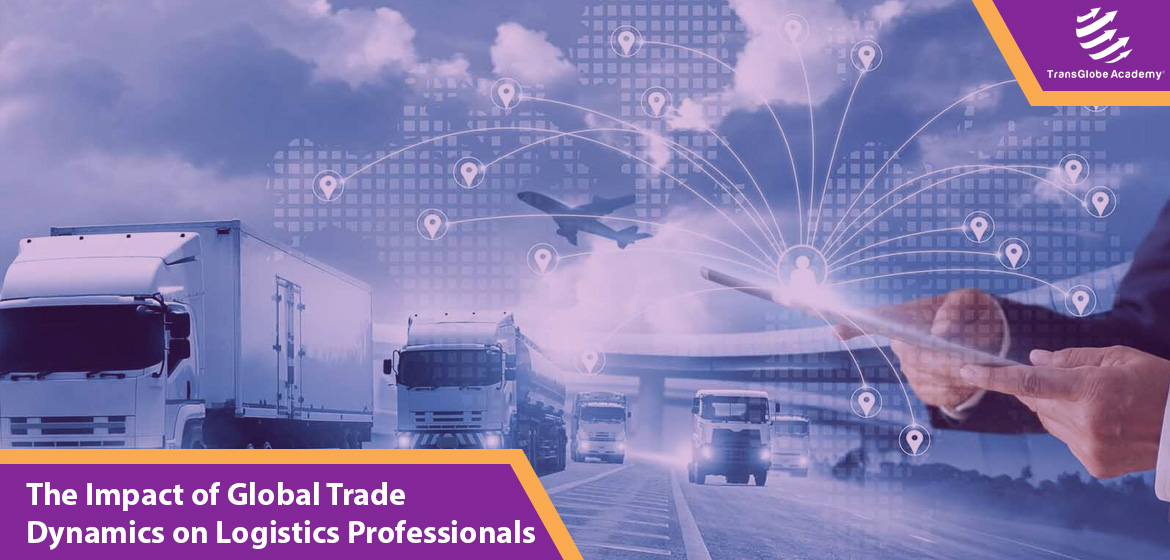The trading environment is constantly changing in a world influenced by many variables: political changes, technological developments, economic policies, and environmental concerns. These changes are very real for those who work in logistics and have direct or indirect implications for how they run their operations. Logistics experts must grasp how global trade dynamics influence them so that they can confidently steer through complex transnational supply chains. These professionals are the foundation of the supply chain sector which is frequently affected by alterations in economic, technological, geopolitical, and environmental parameters. This implies that logistics specialists must keep up with global trade movements that influence their job roles so that they remain competitive.
The Changing Landscape of Global Trade
The dynamics of international trade have always existed, but of late, much more rapid changes have emerged. Current leading transformative forces within the trade sphere are as follows:
- Technological Advancements: Technological advancements have revolutionized the logistics business through the introduction of blockchain technology, artificial intelligence, and Internet of Things (IoT) devices which have made it easier to trace movements in this field. Thus, logistics specialists are in a position to keep an eye on cargoes live as they take place, ascertain the best paths for them as well as anticipate any possible challenges.
- Geopolitical Shifts: Trade regulations and global affairs have a considerable effect on logisticsEvents such as Brexit, the US-China trade war, or regional trading treaties like the Comprehensive and Progressive Agreement for Trans-Pacific Partnership hold deep implications for tariffs, regulations, and market entry.
- Sustainability and Environmental Concerns: The urge for eco-friendliness reshapes modern logistics. Companies are incorporating green logistics options to minimize carbon footprint, comply with regulations, and satisfy their customers’ needs for environment-friendly products.
- Economic Fluctuations: Fluctuations in the economy around the world such as exchange, inflation or even bartering can affect transport volumes and logistics expenditure. Logistics experts must have such knowledge to maintain profit margins and ensure quality in their provisions investments.
Impact on Logistics Professionals
Logistics experts need to adjust in a dynamic global trade environment and retain profit. The following are how these changes affect their work:
- Enhanced Skill Requirements: Most up-to-date supply chains require professional logisticians to acquire skills in digital technologies, data analytics, and cybersecurity. Continuous education is a must to be relevant in an area of operations that has changed.
- Complex Regulatory Environment: International trade regulations are tough to navigate. One has to keep up with all the trade policies, customs, and compliance to avoid any type of delay or disruption.
- Risk Management: The risk of trade increases with geopolitical frailty and economic unpredictability. Experts in logistics have to diversify sources, establish strong networks, and keep stock adaptable.
- Sustainability Initiatives: It will offer an advantage to logistics professionals through sustainable practices: route optimization, eco-friendly vehicles, and circular economy principles.
- Customer Expectations: Thus, in e-commerce and globalization, customer expectations are very high. It is, therefore, the responsibility of professional logistics to ensure timely and accurate deliveries by efficiently planning, tracking, and coordinating in real-time.
The Importance of Learning Logistics and How to Choose the Right Courses
In the modern world, where everything is moving fast and connected, the significance of learning logistics and supply chain management courses cannot be downplayed. In other words, as global trade patterns keep changing, the professionals who work in logistics are very important because they ensure that goods are moved from one place to another smoothly and efficiently all over the world. For someone who hopes to have a career in this ever-changing sector, understanding logistics is necessary. This helps them have the required information for handling complex supply chains, administering rules as well as using new technologies to make things better in business practices.
Transglobe Academy is one of the best logistics training institutes in Kerala. By providing thorough courses and equipping aspiring logistics professionals with appropriate knowledge and skills, that are required to thrive in this ever-changing industry, it can achieve its aim. Competent logistics professionals can operate for efficiency, sustainability, and resilience by keeping pace with global trade dynamics and modernizing their operations through technology, thus ensuring they succeed in the global market.

